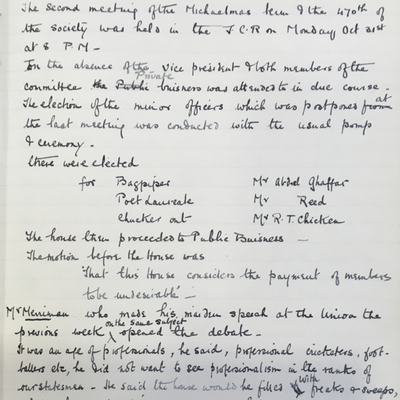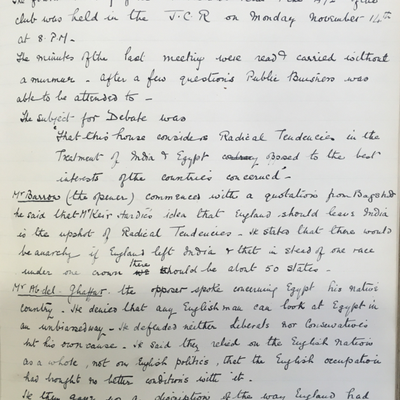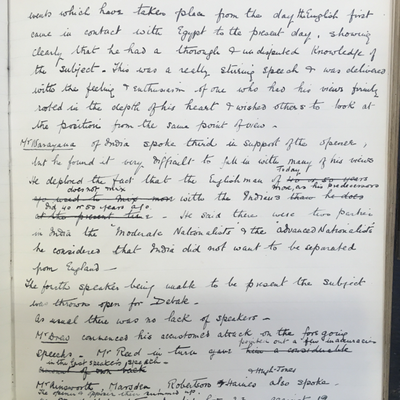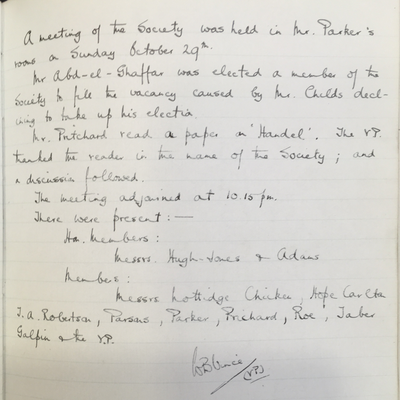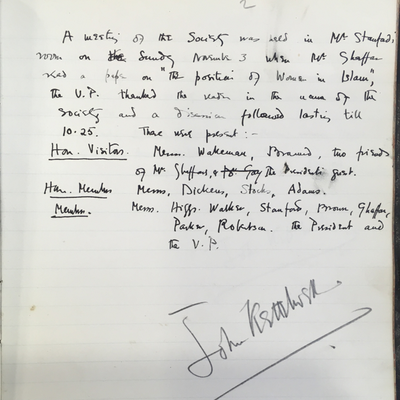Ahmed Abdul El Ghaffar, 1891-? (SJC: 1910‑13)
He was educated at Ras EI Tin School, matriculated in 1910, and took a 3rd in Modern History, earning his BA in 1913, and his MA only in 1962. At St. John’s he was an energetic and eloquent member of the Debating and Essay Societies. While he doesn’t seem to have gone to Essay Society meetings much in his first two years, his attendance picked up in the final year, and in Michaelmas 1912 Ghaffar read an essay to the meeting of 1912, entitled ‘The position of women in Islam’. Ghaffar was an assiduous member of the Debating Society, and one noteworthy occasion, in Michaelmas 1910, presented an impassioned and impressive argument against the British occupation of Egypt at a debate on the subject: ‘That this house considers Radical Tendencies in the Treatment of India and Egypt opposed to the best interests of the countries concerned’. Ghaffar spoke against the motion, and though his speech was not recorded it was described with sympathy and admiration by the President of the Society, G. W. Lambert. H. Narayana, an Indian student who was also present, spoke in very different terms, in support of the opening speaker. The details of the debate may be seen in written in Lambert’s hand, as can the notice of Ghaffar’s essay in the Essay Society minute book, in the accompanying images [from St. John’s College Student Debating Society Minute Books, St. John’s College Archive]. Alas, we have not yet found identifiable photographs of Ghaffar in the Archive, but the search continues.
On his return to Egypt,
Ghaffar would serve as a Minister for Agriculture and Public works, a prominent
figure in the rather turbulent politics of the time. Interestingly, Ghaffar is
recorded in confidential despatches sent from the British Embassy in Cairo to
Ernest Bevin, then in the Foreign Office in London, as being pro-British in his
political stance. The despatches in question were sent in early 1950, and
contain detailed descriptions of what seems to be a comprehensive list of
‘Leading (political) Personalities in Egypt’ Ghaffar’s description begins:
“Educated at Oxford. A leading Liberal Constitutional deputy and a keen private
agriculturist.” In his public role he was, (according to the writer,
Ronald Campbell), “Very outspoken and headstrong. Fearless in the expression of
his pro-British views and criticisms of his political opponents. Somewhat
unbalanced.” [i] The last remark needs to be read carefully in context, given
that colonial records could and did infer characteristics of irrationality or
excess amongst politically active or engaged non-Europeans in public life
without much evidence.
[i] Public Record Office FO371/80342, No. 64, 1011/2/10/50, Unclassified JE 1012/1, “British Embassy Cairo 3 Feb 1950, From Ronald Campbell to Ernest Bevin, MP, Foreign Office, London”. http://nasser.bibalex.org/Data/Docs/BritishDocumentsMerged///FO_371_80342-merged.pdf
